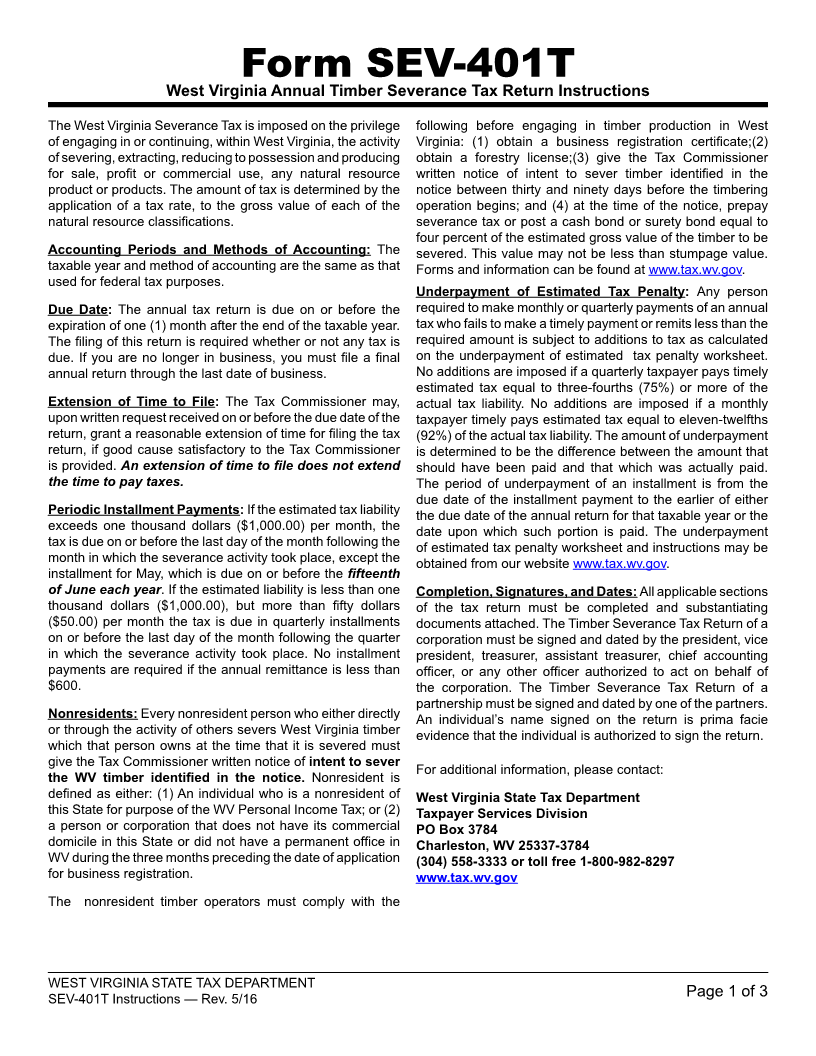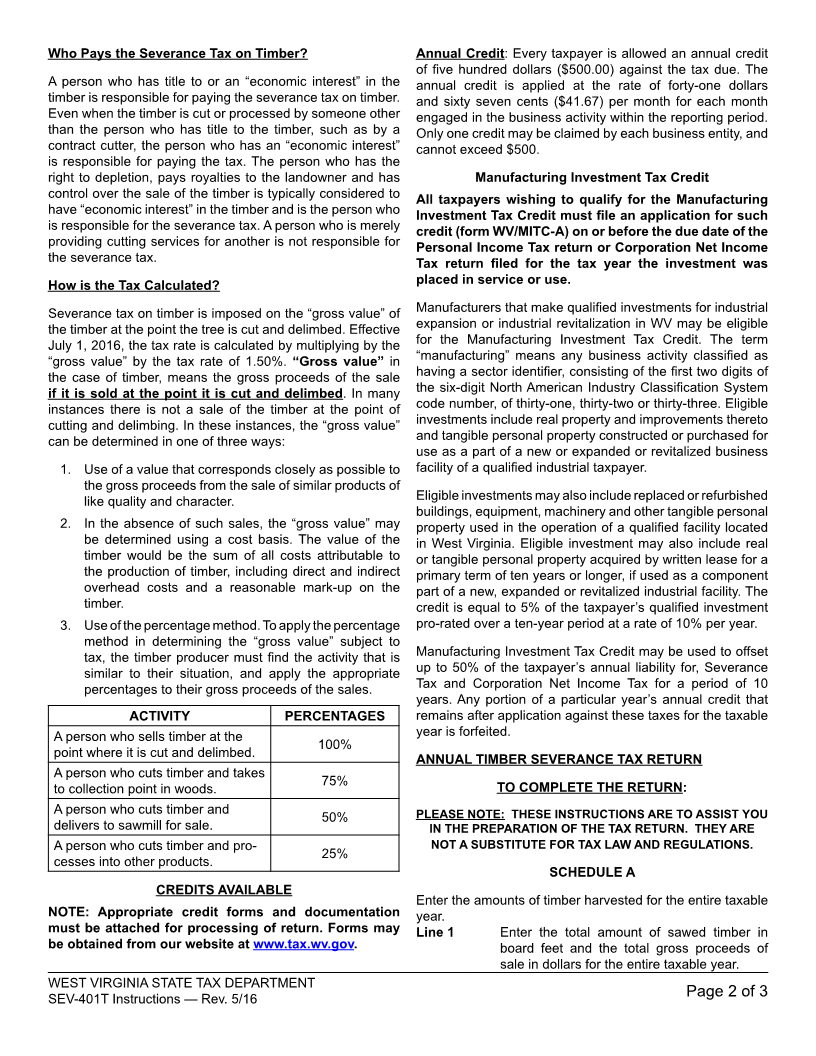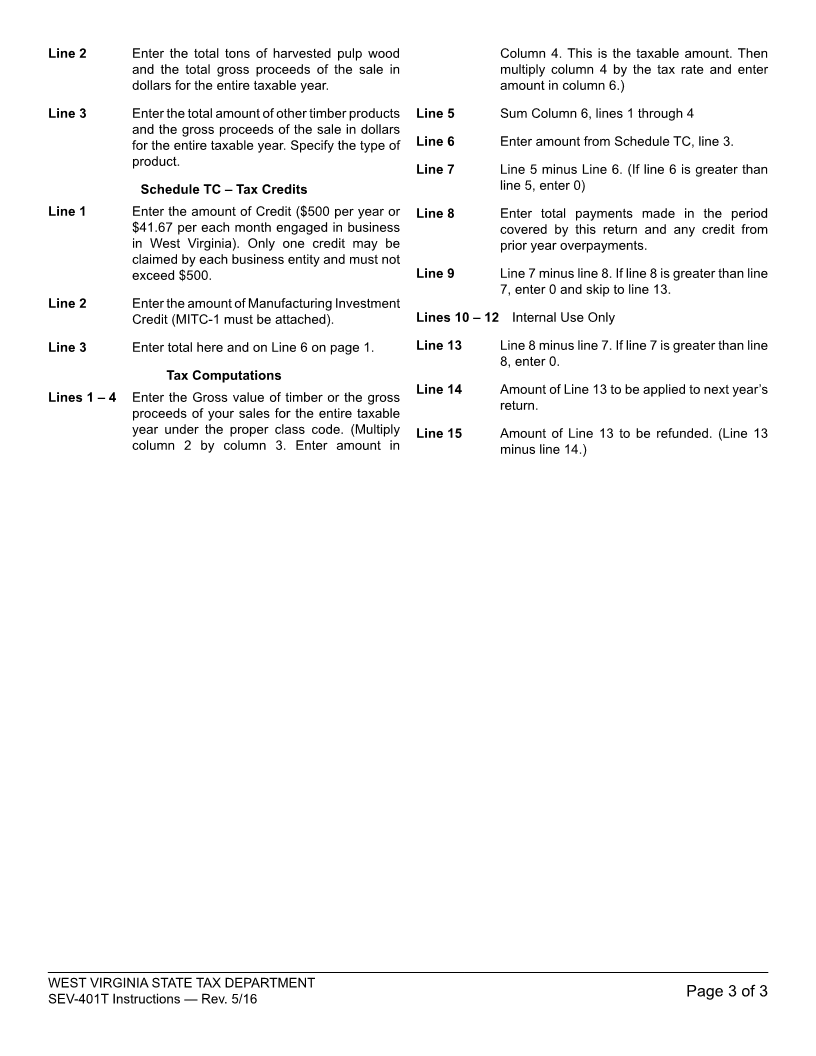
Enlarge image
Form SEV-401T
West Virginia Annual Timber Severance Tax Return Instructions
theWest Virginia severance tax is imposed on the privilege following before engaging in timber production in West
of engaging in or continuing, within West Virginia, the activity Virginia: (1) obtain a business registration certificate;(2)
of severing, extracting, reducing to possession and producing obtain a forestry license;(3) give the tax Commissioner
for sale, profit or commercial use, any natural resource written notice of intent to sever timber identified in the
product or products. the amount of tax is determined by the notice between thirty and ninety days before the timbering
application of a tax rate, to the gross value of each of the operation begins; and (4) at the time of the notice, prepay
natural resource classifications. severance tax or post a cash bond or surety bond equal to
four percent of the estimated gross value of the timber to be
Accounting Periods and Methods of Accounting: the severed. this value may not be less than stumpage value.
taxable year and method of accounting are the same as that Forms and information can be found at www.tax.wv.gov.
used for federal tax purposes.
Underpayment of Estimated Tax Penalty: any person
Due Date: the annual tax return is due on or before the required to make monthly or quarterly payments of an annual
expiration of one (1) month after the end of the taxable year. tax who fails to make a timely payment or remits less than the
The filing of this return is required whether or not any tax is required amount is subject to additions to tax as calculated
due. If you are no longer in business, you must file a final on the underpayment of estimated tax penalty worksheet.
annual return through the last date of business. No additions are imposed if a quarterly taxpayer pays timely
estimated tax equal to three-fourths (75%) or more of the
Extension of Time to File: the tax Commissioner may, actual tax liability. no additions are imposed if a monthly
upon written request received on or before the due date of the taxpayer timely pays estimated tax equal to eleven-twelfths
return, grant a reasonable extension of time for filing the tax (92%) of the actual tax liability. The amount of underpayment
return, if good cause satisfactory to the tax Commissioner is determined to be the difference between the amount that
is provided. An extension of time to file does not extend should have been paid and that which was actually paid.
the time to pay taxes. the period of underpayment of an installment is from the
due date of the installment payment to the earlier of either
Periodic Installment Payments: if the estimated tax liability the due date of the annual return for that taxable year or the
exceeds one thousand dollars ($1,000.00) per month, the date upon which such portion is paid. the underpayment
tax is due on or before the last day of the month following the of estimated tax penalty worksheet and instructions may be
month in which the severance activity took place, except the obtained from our website www.tax.wv.gov.
installment for may, which is due on or before the fifteenth
of June each year. if the estimated liability is less than one Completion, Signatures, and Dates: all applicable sections
thousand dollars ($1,000.00), but more than fifty dollars of the tax return must be completed and substantiating
($50.00) per month the tax is due in quarterly installments documents attached. the timber severance tax return of a
on or before the last day of the month following the quarter corporation must be signed and dated by the president, vice
in which the severance activity took place. no installment president, treasurer, assistant treasurer, chief accounting
payments are required if the annual remittance is less than officer, or any other officer authorized to act on behalf of
$600. the corporation. the timber severance tax return of a
partnership must be signed and dated by one of the partners.
Nonresidents: every nonresident person who either directly an individual’s name signed on the return is prima facie
or through the activity of others severs West Virginia timber evidence that the individual is authorized to sign the return.
which that person owns at the time that it is severed must
give the tax Commissioner written notice of intent to sever
For additional information, please contact:
the WV timber identified in the notice. nonresident is
defined as either: (1) An individual who is a nonresident of West Virginia State Tax Department
this state for purpose of the WV personal income tax; or (2) Taxpayer Services Division
a person or corporation that does not have its commercial PO Box 3784
domicile in this State or did not have a permanent office in Charleston, WV 25337-3784
WV during the three months preceding the date of application (304) 558-3333 or toll free 1-800-982-8297
for business registration. www.tax.wv.gov
the nonresident timber operators must comply with the
West Virginia state tax Department
seV-401t instructions — rev. 5/16 page 1 of 3

